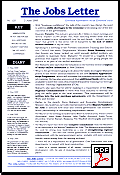



|
 |

|
| No.235 | 26 July 2005 | Essential Information on an Essential Issue |
of key events over the last few weeks. NZ 2ND IN OECD FOR JOB GROWTH GLOBALISATION JOB LOSSES INEVITABLE TAKING AIM AT STATE SECTOR JOBS HIRING EXPECTATIONS AT 6-YEAR HIGH DOL: LABOUR SHORTAGE NEAR RECORD HIGH NATS’ STUDENT LOAN PLAN CHILDREN MISSING OUT TO PRO-WORK POLICIES CALL FOR CHANGE TO “WORKING FOR FAMILIES” CHILDCARE REBATE UNCHANGED SINCE 1982 BRASH: CHILD POVERTY A CYCLE IDEAL WORKER: MARRIED WITH CHILDREN OZ PM EXTOLS NZ’S EX-EMPLOYMENT CONTRACTS ACT BRITISH SCHOOLS TO PROVIDE CHILDCARE SUBSIDISED EU SUGAR JOBS  LAST Letter
LAST Letter
NEXT Letter   Download this issue as a PDF file
Index to Features
29 June 2005The National Party has apparently softened its hard-line approach to women having more children while on the domestic purposes benefit. Earlier this year, in his "Orewa 2" speech, party leader Don Brash said there shouldn't be automatic entitlement to additional state assistance for those who have further children while on the DPB. The rhetoric was absent from National's welfare spokesperson Judith Collins' address to the Party's annual conference in June. Collins says children have to be protected from poverty and she believes the plan was to provide "really, really intensive case-management" for women on the DPB having more children. 1 July 2005The number of Pacific Island people registered as unemployed has dropped from 5,532 in July 2003 to 2,622 in July 2005. Over the last year, the roading industry has taken on an additional 1,000 employees, according to Roading NZ. The number of building consents issued for May were down 22% on the previous year, according to Statistics NZ. 3 July 2005A quarter of NZ-born people who are tertiary educated live outside of NZ, according to the NZ Listener. Australia ranks well down (21st) the OECD in the rate of employment of working age men. Australian Treasury Secretary Ken Henry is puzzled by the continuing high joblessness among men in their prime, saying the problem seems to be structural, not cyclic. 4 July 2005Te Wananga o Aotearoa says its School of Sustainable Business Management's Certificate in Small Business Management has resulted in over 1,000 business start-ups since 2003. Director Keith Ikin says most of the people who take this course were either unemployed or workers on low wages. Rapidly dropping migration, higher interest rates and the high dollar are accumulating to slow the NZ economy according to the Westpac bank. Chief economist Brendan O'Donovan says if it weren't for the strength of the housing market, recession would be "the talk of the day". South Africa will leave its current labour laws intact, at least until more detailed research is completed. The IMF maintains SA labour regulations are hampering job creation but the government says there will be no "sea of change" without more information. SA unemployment is officially 26% — but some say it could be as high as 40% if discouraged jobseekers were counted. 5 July 2005The Westpac McDermott Miller quarterly Employment Confidence Index finds two-thirds of NZ workers rate jobs as being plentiful. But workers think jobs will be harder to find next year. Labour hire company Allied Work Force Group lists on the NZ Stock Exchange. The European Commission shelves a long-term environmental strategy because of concerns it would constrict the economy and destroy jobs. 7 July 2005Between 400_1,000 more workers are needed in Marlborough vineyards to prune grapevines. NZ Wine Growers chief Philip Gregan says there is a risk a short-term labour problem could become a long-term one, as the grape growing area is expected to expand by one-third over the next five years. Gregan: "We've going to need 40% more labour in five years' time. Getting people here on a sustainable basis to prune the vineyards is a real concern." 10 July 2005The US unemployment rate drops from 5.1% to 5%, the lowest level in about four years. The G8 leaders pledge to end farm export subsidies but set no specific deadline for doing so. Electronics giant Sanyo will cut 14,000 jobs worldwide over the next three years. 11 July 2005ANZ job ad indicator records a 5.5% drop in newspaper job ads on this time last year. 12 July 2005The NZ economy appears to be growing, but more slowly than it has been. A total of 8% of businesses say their trading activity has increased over the quarter, but this is the weakest measure in nearly five years. The government says it met its immigration target for the 2004/05 year and will keep it at 45,000 for 2005/06. Minister of Immigration Paul Swain says 48,815 people were granted residency in 2004/05, with 29,826 coming in under the skilled/business category. Swain says NZ is attracting quality migrants including teachers, nurses, tradespeople and IT professionals. 87% had a skilled job or job offer at the time they were granted residence. About 60% of the jobs were in areas other than Auckland. 18 July 2005In a shake-up to tertiary education funding, the Minister of Education Trevor Mallard is putting a cap on student numbers in courses below degree level, and is replacing the localised "community education budget" with a centralized scheme. Courses found to be of low relevance by the Tertiary Education Strategy review are getting the chop and their funding (about $160m/yr) will be redirected to numeracy and literacy courses and apprenticeships. The National Maori Tertiary Students Association is "outraged" by the plan to cut funding to certificate and diploma level courses. Spokeswoman Veronica Tawhai says the government has taken credit for increases in Maori participation at the tertiary level and then attacks the very courses and institutions that are behind that increase. Tawhai: "More than 80% of Maori students start their studies at certificate and diploma level, and then staircase, often to higher level courses as they become familiar with tertiary study. These cuts will have a rapid and devastating impact on Maori enrolments." 19 July 2005Computer manufacturer Hewlett-Packard will cut 14,500 jobs worldwide, one-tenth of its workforce. HP NZ staff will probably not be affected by the cuts. 20 July 2005The decline in the use of film cameras sees film and camera maker Eastman Kodak cut a further 10,000 jobs worldwide, on top of the 15,000 job cuts announced in early 2004.
 LAST Diary
LAST Diary
NEXT Diary 
|
NZ 2ND IN OECD FOR JOB GROWTHOECD expects the New Zealand unemployment rate to rise to be 4% by the end of this year and 4.5% next year.
Source _ Dominion Post, 29 June 2005, "NZ in second place for jobs growth " by Kim Ruscoe;; Media release, National Party Finance Spokesman John Key, 5 July 2005, "OECD critical of Labour roadblocks"; Dominion Post, 7 July 2005, "OECD report on NZ something to savour" by Vernon Small.
GLOBALISATION JOB LOSSES INEVITABLEBut the OECD says claims that globalisation is the main cause of labour market problems are exaggerated and only a fraction of job losses are likely to be directly attributable to trade and investment liberalisation. The report: "Job losses in some sectors, along with new job opportunities in other sectors, are an inevitable accompaniment of the process of globalisation. The challenge is to ensure that the adjustment process involved in matching available workers with new job openings works as smoothly as possible." However, the report does concede that workers who lose their jobs in sectors hit by competition from imports often find it harder to get new jobs and may have to accept big pay cuts. In many cases, they are older and less educated than other job-seekers, with skills that no longer correspond to current needs. The report recommends countries ensure their own labour markets are dynamic and that providing people with opportunities and incentives to work is more important than ever. The report warns that failure to acknowledge the "worker adjustment challenges" of globalisation may erode public support for open trade policies.
Source — Irish Business News, 29 June 2005, "OECD urges more dynamic employment policies as response to globalisation" by Finfacts Team.TAKING AIM AT STATE SECTOR JOBS National Finance spokesperson John Key is promising a full review of government spending,
with a close look at state sector jobs. Key believes there has been wasted spending and indiscriminate
hiring in the state sector. He says the news that almost half of state agencies plan to increase staff numbers
is because the government has given them a "clear green light" to keep hiring. Key: "The government
is now in direct competition with the private sector, accelerating the pressure on the private sector to
pay more, soaking up the skilled workers." National Finance spokesperson John Key is promising a full review of government spending,
with a close look at state sector jobs. Key believes there has been wasted spending and indiscriminate
hiring in the state sector. He says the news that almost half of state agencies plan to increase staff numbers
is because the government has given them a "clear green light" to keep hiring. Key: "The government
is now in direct competition with the private sector, accelerating the pressure on the private sector to
pay more, soaking up the skilled workers."
Harris also found that the size of the public sector in New Zealand — compared with the size of the private sector — was above the OECD average in 1999 but by 2004 it was significantly below the average. This is because, while government spending has grown, the economy has grown faster. The public sector now makes up 2.34% of the New Zealand workforce. — The Myth Of The Exploding Public Sector, May 2005, published by the Public Service Association, written by Peter Harris can be found here. Source _ Dominion Post, 25 June 2005, "Dukes of Wellington" by James Weir; CTU Monthly Economic Bulletin, June 2005, The Myth Of The Exploding Public Sector, May 2005, commissioned by the Pubic Service association, written by Peter Harris.
HIRING EXPECTATIONS AT 6-YEAR HIGHHudson NZ general manager Marc Burridge says that despite indicators showing business confidence is faltering in some areas, the research shows businesses remain optimistic in their hiring outlook. Burridge: "The results demonstrate how dramatic the skill shortage has been. Employers are operating on a reduced headcount and with growth predicted to continue, albeit at a reduced rate, they are still desperate to find the right people with the right skills." The survey also shows the government sector has its strongest hiring intentions than at any time in the past three years. 49% of government agencies surveyed expect to hire more staff in the next six months. Source - TVNZ One News, 21 June 2005, "Skills shortage drastic: report".DOL: LABOUR SHORTAGE NEAR RECORD HIGHDemand for skilled workers remains near a record high, with 60% of firms having difficulty getting suitable staff. Another sign of the tight labour market has been an increase in staff turnover, which has reached a 20-year high. — Skills in the Labour Market, published by the Department of Labour, last updated 23 June 2005, can be found here.
NATS' STUDENT LOAN PLANNZ University Students Association is not impressed, saying it is a policy of tax rebates for the rich and would miss some of those most in need. Co-president Camilla Belich points out that borrowers who take time off work, or those on low incomes wouldn't benefit. Belich: What we'd like them to do is to commit to increasing eligibility to allowances and commit to not increase fees, or lowering them." Source - New Zealand Herald, 22 July 2005, "National to cut debt repayment time" by Ainsley Thomson and Errol Kiong; Dominion Post, 22 July 2005, Brain drain in Nat's sights" by Michelle Quirke.CHILDREN MISSING OUT TO PRO-WORK POLICIES Former Children's Commissioner Dr Ian Hassall has criticised both major political parties
for pushing mothers back to work too soon. Hassall, who is involved in the
Every Child Counts campaign, points out that the leaders of both the Labour and National parties used agenda-setting
speeches this year to speak about getting more women into the workforce without addressing the issue of
children. He criticised Prime Minister Helen Clark for her opening speech to Parliament this year
about increasing women's participation in the paid workforce, as well as National leader Don Brash's
Orewa speech about getting solo mothers off the domestic purposes benefit and into work. Hassall: "I'm
not knocking that. But missing from their discussion was children's interests. The discussion
revolved around economic productivity, gender equity, limitations on welfare spending, welfare
dependency, personal choice. Where were children in all of that?" Former Children's Commissioner Dr Ian Hassall has criticised both major political parties
for pushing mothers back to work too soon. Hassall, who is involved in the
Every Child Counts campaign, points out that the leaders of both the Labour and National parties used agenda-setting
speeches this year to speak about getting more women into the workforce without addressing the issue of
children. He criticised Prime Minister Helen Clark for her opening speech to Parliament this year
about increasing women's participation in the paid workforce, as well as National leader Don Brash's
Orewa speech about getting solo mothers off the domestic purposes benefit and into work. Hassall: "I'm
not knocking that. But missing from their discussion was children's interests. The discussion
revolved around economic productivity, gender equity, limitations on welfare spending, welfare
dependency, personal choice. Where were children in all of that?"
Hassall says the financial and social coercion for people to return to the workforce after their children are born is wrong. He says women should not be told that they were bludgers if they stayed at home with young children. Hassall: "They should be told that this is a recognised, respectable way of life — to raise children. It is very strange that we have to say this." Source _ New Zealand Herald, 30 June 2005, "Anti-children policies rapped" by Simon CollinsCALL FOR CHANGE TO "WORKING FOR FAMILIES" The Child Poverty Action Group (CPAG) calls for changes to the "Working for Families"
package, saying it has already disappointed the nation's worst-off children. Spokesperson Susan St
John says families with any benefit income at all have missed out on the $15 per week child Tax Credit
and most had their core benefit cut (along with changes that have resulted in reductions to the
Special Benefit) that have offset the highly publicised gains from increases to Family Support. The Child Poverty Action Group (CPAG) calls for changes to the "Working for Families"
package, saying it has already disappointed the nation's worst-off children. Spokesperson Susan St
John says families with any benefit income at all have missed out on the $15 per week child Tax Credit
and most had their core benefit cut (along with changes that have resulted in reductions to the
Special Benefit) that have offset the highly publicised gains from increases to Family Support.
CPAG believes a major flaw in the "Working for Families" package is using child payments as work incentives. St John says many other countries don't do this. St John maintains that people want to work but it is the availability of suitable work that is their key driver, not work-related child supplements. She argues that when the economy booms, more people get jobs but what poor families need is a secure reliable income supplement for their children that doesn't disappear during hard times. St John says there are better ways to encourage people to take up paid work, pointing out the Australian government uses lower rates of abatement of family assistance and generous thresholds. Source - New Zealand Herald, 17 June 2005, "Don't ignore the poorest children" by Susan St John.
CHILDCARE REBATE UNCHANGED SINCE 1982 Parents Centres NZ is pushing for the government to have a new look at the rebate
working parents can claim back for childcare, saying the current rebate did not stack up with the
government's stated policy of encouraging mothers into the workforce. Working parents can claim back $310
per year tax rebate for childcare, a sum Parents Centres chief executive Viv Gurrey calls "paltry and
insulting". Many working parents spend thousands of dollars each year on crèche fees, costs that are
directly related to the second parent working. Gurrey says revisiting the childcare rebate is something the
government could do to make it more attractive for women considering returning to work. Parents Centres NZ is pushing for the government to have a new look at the rebate
working parents can claim back for childcare, saying the current rebate did not stack up with the
government's stated policy of encouraging mothers into the workforce. Working parents can claim back $310
per year tax rebate for childcare, a sum Parents Centres chief executive Viv Gurrey calls "paltry and
insulting". Many working parents spend thousands of dollars each year on crèche fees, costs that are
directly related to the second parent working. Gurrey says revisiting the childcare rebate is something the
government could do to make it more attractive for women considering returning to work.
Gurrey suggests New Zealand learn from Australia's increasingly strong financial support provided to families. Under new rebates in Australia, parents can claim up to $4,000 a year per child for childcare costs. In New Zealand the maximum rebate is a flat $310, irrespective of the number of children involved, an amount unadjusted since 1982. Source - Sunday Star-Times, 26 June 2005 "Childcare rebate `insulting' to working parents" by Ruth Laugesen; Dominion Post, 7 JULY 2005, "National launches $160m childcare plan" by Deborah Diaz.BRASH: CHILD POVERTY A CYCLE National Party leader Don Brash tells National Radio's Morning Report that he could not
guarantee his proposed tax cuts would not increase child poverty. Asked to guarantee his policies would
not lead to an increase in child poverty or the use of food banks, Brash said: "There's a cycle of
these things, they go up and down. I can't promise anything in that area but let me say this, the best way
of dealing with child poverty, the best way of dealing with food banks is getting people into jobs, it's to
do with welfare reform, to get welfare rorts out of the system, to deal with welfare dependency. That's
the most effective way of dealing with this." National Party leader Don Brash tells National Radio's Morning Report that he could not
guarantee his proposed tax cuts would not increase child poverty. Asked to guarantee his policies would
not lead to an increase in child poverty or the use of food banks, Brash said: "There's a cycle of
these things, they go up and down. I can't promise anything in that area but let me say this, the best way
of dealing with child poverty, the best way of dealing with food banks is getting people into jobs, it's to
do with welfare reform, to get welfare rorts out of the system, to deal with welfare dependency. That's
the most effective way of dealing with this."
• Minister of Social Development and Employment Steve Maharey calls Brash's statement "astonishing". Maharey says virtually every other government and major political party in the OECD has made a public commitment to reduce or eliminate child poverty. Maharey: "Don Brash is refusing to promise his tax cuts won't increase child poverty and bring back food bank queues because he knows they will." Edridge points out that New Zealand ranked fourth worst out of 24 countries in the UNICEF report Child Poverty in Rich Nations 2005 published earlier this year (See Jobs Letter No 226). Edridge: "Child poverty in New Zealand has in the past been seen as an unimportant by-product of economic policy. For example, as a consequence of the 1991 `Mother of all Budgets' it broke through the 30% level. In a country like Denmark, the elimination of child poverty is seen as an essential economic goal. It is a critical investment in the country's future." Source - Media release Every Child Counts, 22 June 2005, "Don Brash disturbing on child poverty"; Media release Steve Maharey, 21 June 2005, "Brash: child poverty could reise under National; Media release Steve Maharey, 22 June 2005, "Brash cuts ignore danger of child poverty".
IDEAL WORKER: MARRIED WITH CHILDRENLee Adams says as society moves progressively away from the traditional family of one breadwinner and one homemaker, government labour policies need to consider the balance between working and home life. Sole parents with caring obligations had to be supported, as they don't have the same energy or time to devote to paid labour as workers who share caring responsibilities. Adams: "We need to adapt work to recognise family responsibilities come with every worker." — Regulating at the Work-Life Boundary: Towards Re-Integrating the Household into Labour Market Policy was presented at the Labour Law, Equity and Efficiency: Structuring and Regulating the Labour Market for the 21st Century conference at the University of Melbourne, 8-9 July 2005. Source - Dominion Post, 2 July 2005, "Behind a good worker is a good homemaker", AAP.OZ PM EXTOLS NZ'S EX-EMPLOYMENT CONTRACTS ACT Australian Prime Minister John Howard's government is about to embrace labour reforms
similar to New Zealand's Employment Contract Act (1991) that did away with the award system,
required workers to have individuals employment contracts and relieved employers of having to negotiate with
a union — even if their employee was a member. Howard believes similar moves in Australia
would increase productivity and economic growth. Australian Prime Minister John Howard's government is about to embrace labour reforms
similar to New Zealand's Employment Contract Act (1991) that did away with the award system,
required workers to have individuals employment contracts and relieved employers of having to negotiate with
a union — even if their employee was a member. Howard believes similar moves in Australia
would increase productivity and economic growth.
However, research shows that both New Zealand's economy and its workers suffered under the economic reforms that included the Employment Contract Act. A paper, published in the Review of Political Economy in 2002 by New Zealand economist Paul Dalziel revealed, that during the New Zealand economic reforms, gross domestic product was reduced, the average unemployment rate increased substantially, productivity growth declined, and the real income of low-income households declined. In 1996, the poorest New Zealanders had 3% less household income than they had in 1984. Domestic productivity in New Zealand grew just 5.2% between 1987 and 1998 while Australia productivity rose by 21.9% during a similar period. The paper says the recognition of this fact was one of the considerations leading to a Labour-led coalition government to replace the Employment Contract Act in 2000. The paper: "The hope in 1984 was that economic reform would reverse the trend of the previous 30 years. Seventeen years later, with higher unemployment and lower real incomes at the bottom end of New Zealand's income distribution, it is clear that the comprehensive reforms of the late 1980s and early 1990s did not achieve that core objective." Source - Sydney Morning Herald, 21 July 2005, "NZ figures deal blow to Howard" by Nick O'Malley with AAP; Abstract of New Zealand's Economic Reforms: an assessment, 1 January 2002, published by Routledge, written by Paul Dalziel.BRITISH SCHOOLS TO PROVIDE CHILDCARE The British government has launched a £680 million initiative to help support working
parents with childcare. The plan is to keep schools open during parents' common working hours in a
move designed to end the culture of "latch key kids" who go home after school to no supervision.
Education Secretary Ruth Kelly says, "If we want to keep children from hanging out and causing trouble,
and parents to go out to work, the days of schools opening 9am - 3pm are over." The British government has launched a £680 million initiative to help support working
parents with childcare. The plan is to keep schools open during parents' common working hours in a
move designed to end the culture of "latch key kids" who go home after school to no supervision.
Education Secretary Ruth Kelly says, "If we want to keep children from hanging out and causing trouble,
and parents to go out to work, the days of schools opening 9am - 3pm are over."
The new "Kelly hours" are seen to be a way to bring school hours into line with the routine of working parents. Under the proposal, by 2010, all parents of primary age children should have access to affordable childcare — at or through their school — 8am - 6pm all year round. All secondary schools will also be open from 8am - 6pm all year round. And all three and four-year-olds will receive 15 hours of free "integrated early learning and care" for 38 weeks of the year. "Kelly hours" will see schools running breakfast clubs before class (something some UK schools are already doing) and a range of after-school programmes such as language clubs, indoor rock-climbing, music, drama and arts, depending on local needs. One key feature, aimed at getting support from schools, is that teachers won't be required to participate. Volunteers, community groups or private companies will provide the "Kelly hours" programme. David Hart, general secretary of the National Association of Head Teachers is supportive of the plan but says it is "fanciful" to suggest that the extra hours would not make extra demands on teachers and headteachers. Mr Hart also warned that parents would undoubtedly be charged for the clubs. Source - Times Online, 13 June 2005, "Longer school hours to benefit working parents" by Sam Knight, The Mirror, 13 June 2005, "10 hours at school - Kelly to end scandal of latch key kids", By Oonagh Blackman Political EditorSUBSIDISED EU SUGAR JOBS The European sugar industry estimates as many as 100,000 farm, processing and associated
jobs could disappear if price supports and guarantees are dropped. French, Irish and German farmers
and producers say the proposed 40% cuts to guaranteed prices are far too high and unnecessary. It
claims the move could push smaller producers like Italy, Ireland, Greece and Portugal out of the
industry altogether and could concentrate the industry into just half a dozen big processors. The European sugar industry estimates as many as 100,000 farm, processing and associated
jobs could disappear if price supports and guarantees are dropped. French, Irish and German farmers
and producers say the proposed 40% cuts to guaranteed prices are far too high and unnecessary. It
claims the move could push smaller producers like Italy, Ireland, Greece and Portugal out of the
industry altogether and could concentrate the industry into just half a dozen big processors.
However, the European Commission says sharp cuts to guaranteed prices for farmers and millers are necessary. EC Agricultural Commissioner Mariann Fischer Boel argues that the EU sugar regime has been left untouched for 40 years and has inflated prices to three times their level on the world market. The Commission is taking aim at the €1.24 billion sugar industry support system that results in European producers illegally dumping their excess production on the world market thereby displacing industries in some developing nations. Source _ Guardian Weekly July 1-7 2005, "Sugar shake-up could cost 95,000 jobs". |